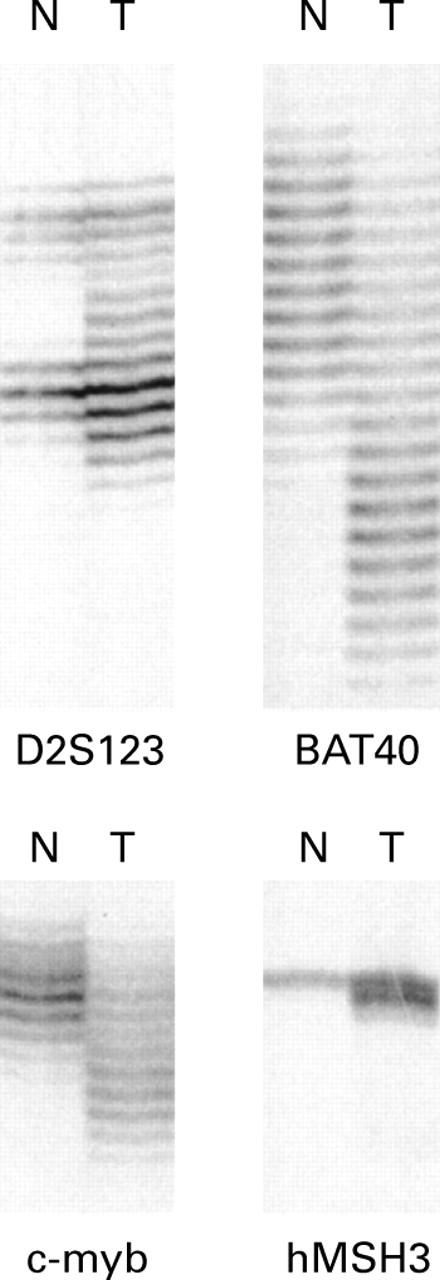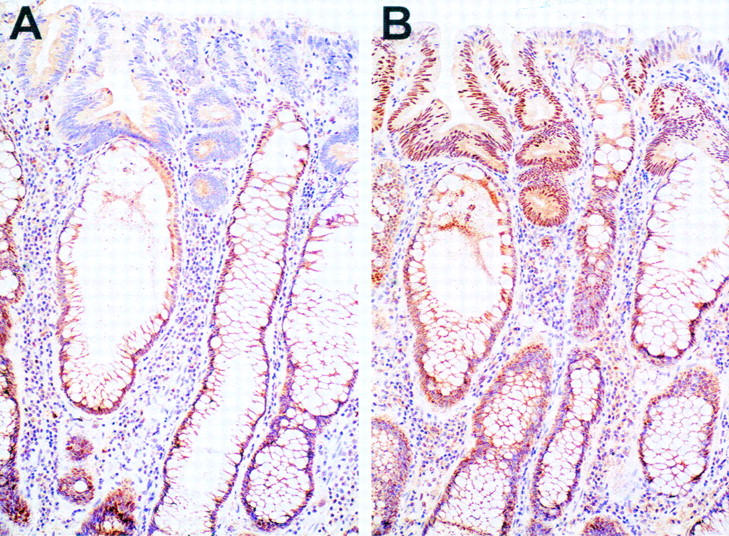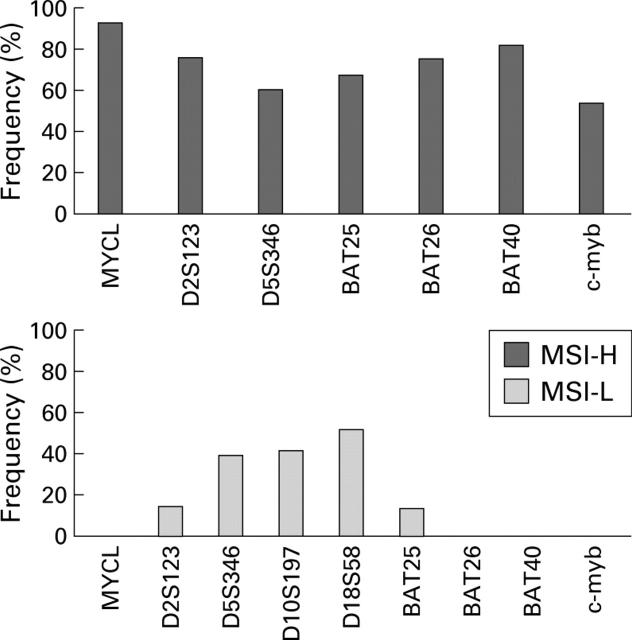Abstract
BACKGROUND AND AIM—Hereditary non-polyposis colorectal cancer (HNPCC), as its name implies, is associated with few adenomas, and the early evolution of colorectal neoplasia is poorly understood. In this study our aim was to clarify the genetic profiles of benign polyps in subjects with HNPCC using a combined molecular and immunohistochemical approach. METHODS—Thirty adenomas and 17 hyperplastic polyps were obtained from 24 affected HNPCC subjects. DNA was extracted from paraffin embedded tissue by microdissection and analysed for the presence of microsatellite instability (MSI) and mutations in five genes known to be targets in mismatch repair deficiency (TGFβRII, IGF2R, BAX, hMSH3, and hMSH6). Serial sections were stained by immunohistochemistry for hMLH1 and hMSH2. RESULTS—Twenty four (80%) of 30 adenomas showed MSI. Of MSI positive adenomas, 66.7% showed MSI at more than 40% of markers (high level of MSI (MSI-H)). Two of 17 hyperplastic polyps revealed MSI at one marker (low level of MSI (MSI-L)). A significant association was found between MSI-H and high grade dysplasia in adenomas (p=0.004). Eight of nine adenomas with mutations of coding sequences revealed high grade dysplasia and all nine were MSI-H. Four of the nine ranged in size from 2 to 5 mm. The presence of the hMSH6 mutation was significantly correlated with high levels of MSI (80% of markers) (p<0.02). Twenty four adenomas gave evaluable results with immunohistochemistry. One of six (17%) microsatellite stable, six of seven (86%) MSI-L, and 11 of 11 (100%) MSI-H adenomas showed loss of either hMLH1 or hMSH2. CONCLUSIONS—Most adenomas in subjects with a definite diagnosis of HNPCC show MSI (80%). The finding of MSI-L is usually associated with loss of expression of hMLH1 or hMSH2, unlike the situation in MSI-L sporadic colorectal cancer. The transition from MSI-L to MSI-H correlated with the finding of high grade dysplasia and mutation of coding sequences and may be driven by mutation of secondary mutators such as hMSH3 and hMSH6. Advanced genetic changes may be present in adenomas of minute size. Keywords: adenoma; microsatellite instability; mismatch repair; hereditary non-polyposis colorectal cancer
Full Text
The Full Text of this article is available as a PDF (204.8 KB).
Figure 1 .

Sample of four loci showing bandshifts, including three microsatellite loci (D2S123, BAT40, and c-myb) and the poly(A)8 tract of hMSH3. DNA was extracted from a 2 mm tubular adenoma from a patient carrying a germline mutation of hMSH2. Despite the small size of the adenoma, all nine microsatellite loci showed instability, as did hMSH6 (not shown). N, normal; T, tumour DNA.
Figure 2 .
Frequency of bandshifts in microsatellite markers used to distinguish MSI-H and MSI-L adenomas. All markers are sensitive for MSI-H adenomas whereas dinucleotide markers (particularly D5S346, D10S197, and D18S58) are sensitive for MSI-L adenomas.
Figure 3 .

Loss of hMSH2 (A) and retention of hMLH1 (B) in a 3 mm tubular adenoma that was MSI-H. The subject had a known germline mutation of hMSH2. Immunohistochemical staining with anti-hMSH2 and anti-MLH1.
Selected References
These references are in PubMed. This may not be the complete list of references from this article.
- Aaltonen L. A., Peltomäki P., Leach F. S., Sistonen P., Pylkkänen L., Mecklin J. P., Järvinen H., Powell S. M., Jen J., Hamilton S. R. Clues to the pathogenesis of familial colorectal cancer. Science. 1993 May 7;260(5109):812–816. doi: 10.1126/science.8484121. [DOI] [PubMed] [Google Scholar]
- Aaltonen L. A., Peltomäki P., Mecklin J. P., Järvinen H., Jass J. R., Green J. S., Lynch H. T., Watson P., Tallqvist G., Juhola M. Replication errors in benign and malignant tumors from hereditary nonpolyposis colorectal cancer patients. Cancer Res. 1994 Apr 1;54(7):1645–1648. [PubMed] [Google Scholar]
- Ahlquist D. A. Aggressive polyps in hereditary nonpolyposis colorectal cancer: targets for screening. Gastroenterology. 1995 May;108(5):1590–1592. doi: 10.1016/0016-5085(95)90711-4. [DOI] [PubMed] [Google Scholar]
- Akiyama Y., Iwanaga R., Saitoh K., Shiba K., Ushio K., Ikeda E., Iwama T., Nomizu T., Yuasa Y. Transforming growth factor beta type II receptor gene mutations in adenomas from hereditary nonpolyposis colorectal cancer. Gastroenterology. 1997 Jan;112(1):33–39. doi: 10.1016/s0016-5085(97)70216-6. [DOI] [PubMed] [Google Scholar]
- Akiyama Y., Sato H., Yamada T., Nagasaki H., Tsuchiya A., Abe R., Yuasa Y. Germ-line mutation of the hMSH6/GTBP gene in an atypical hereditary nonpolyposis colorectal cancer kindred. Cancer Res. 1997 Sep 15;57(18):3920–3923. [PubMed] [Google Scholar]
- Biden K. G., Simms L. A., Cummings M., Buttenshaw R., Schoch E., Searle J., Gobe G., Jass J. R., Meltzer S. J., Leggett B. A. Expression of Bcl-2 protein is decreased in colorectal adenocarcinomas with microsatellite instability. Oncogene. 1999 Feb 4;18(5):1245–1249. doi: 10.1038/sj.onc.1202413. [DOI] [PubMed] [Google Scholar]
- Cawkwell L., Gray S., Murgatroyd H., Sutherland F., Haine L., Longfellow M., O'Loughlin S., Cross D., Kronborg O., Fenger C. Choice of management strategy for colorectal cancer based on a diagnostic immunohistochemical test for defective mismatch repair. Gut. 1999 Sep;45(3):409–415. doi: 10.1136/gut.45.3.409. [DOI] [PMC free article] [PubMed] [Google Scholar]
- Dib C., Fauré S., Fizames C., Samson D., Drouot N., Vignal A., Millasseau P., Marc S., Hazan J., Seboun E. A comprehensive genetic map of the human genome based on 5,264 microsatellites. Nature. 1996 Mar 14;380(6570):152–154. doi: 10.1038/380152a0. [DOI] [PubMed] [Google Scholar]
- Fujiwara T., Stolker J. M., Watanabe T., Rashid A., Longo P., Eshleman J. R., Booker S., Lynch H. T., Jass J. R., Green J. S. Accumulated clonal genetic alterations in familial and sporadic colorectal carcinomas with widespread instability in microsatellite sequences. Am J Pathol. 1998 Oct;153(4):1063–1078. doi: 10.1016/S0002-9440(10)65651-9. [DOI] [PMC free article] [PubMed] [Google Scholar]
- Grady W. M., Rajput A., Myeroff L., Liu D. F., Kwon K., Willis J., Markowitz S. Mutation of the type II transforming growth factor-beta receptor is coincident with the transformation of human colon adenomas to malignant carcinomas. Cancer Res. 1998 Jul 15;58(14):3101–3104. [PubMed] [Google Scholar]
- Heinen C. D., Shivapurkar N., Tang Z., Groden J., Alabaster O. Microsatellite instability in aberrant crypt foci from human colons. Cancer Res. 1996 Dec 1;56(23):5339–5341. [PubMed] [Google Scholar]
- Iino H., Jass J. R., Simms L. A., Young J., Leggett B., Ajioka Y., Watanabe H. DNA microsatellite instability in hyperplastic polyps, serrated adenomas, and mixed polyps: a mild mutator pathway for colorectal cancer? J Clin Pathol. 1999 Jan;52(1):5–9. doi: 10.1136/jcp.52.1.5. [DOI] [PMC free article] [PubMed] [Google Scholar]
- Jacoby R. F., Marshall D. J., Kailas S., Schlack S., Harms B., Love R. Genetic instability associated with adenoma to carcinoma progression in hereditary nonpolyposis colon cancer. Gastroenterology. 1995 Jul;109(1):73–82. doi: 10.1016/0016-5085(95)90270-8. [DOI] [PubMed] [Google Scholar]
- Jass J. R., Biden K. G., Cummings M. C., Simms L. A., Walsh M., Schoch E., Meltzer S. J., Wright C., Searle J., Young J. Characterisation of a subtype of colorectal cancer combining features of the suppressor and mild mutator pathways. J Clin Pathol. 1999 Jun;52(6):455–460. doi: 10.1136/jcp.52.6.455. [DOI] [PMC free article] [PubMed] [Google Scholar]
- Jass J. R. Colorectal adenomas in surgical specimens from subjects with hereditary non-polyposis colorectal cancer. Histopathology. 1995 Sep;27(3):263–267. doi: 10.1111/j.1365-2559.1995.tb00219.x. [DOI] [PubMed] [Google Scholar]
- Jass J. R., Cottier D. S., Pokos V., Parry S., Winship I. M. Mixed epithelial polyps in association with hereditary non-polyposis colorectal cancer providing an alternative pathway of cancer histogenesis. Pathology. 1997 Feb;29(1):28–33. doi: 10.1080/00313029700169494. [DOI] [PubMed] [Google Scholar]
- Jass J. R., Stewart S. M., Stewart J., Lane M. R. Hereditary non-polyposis colorectal cancer--morphologies, genes and mutations. Mutat Res. 1994 Oct 1;310(1):125–133. doi: 10.1016/0027-5107(94)90016-7. [DOI] [PubMed] [Google Scholar]
- Johnson R. E., Kovvali G. K., Prakash L., Prakash S. Requirement of the yeast MSH3 and MSH6 genes for MSH2-dependent genomic stability. J Biol Chem. 1996 Mar 29;271(13):7285–7288. doi: 10.1074/jbc.271.13.7285. [DOI] [PubMed] [Google Scholar]
- Konishi M., Kikuchi-Yanoshita R., Tanaka K., Muraoka M., Onda A., Okumura Y., Kishi N., Iwama T., Mori T., Koike M. Molecular nature of colon tumors in hereditary nonpolyposis colon cancer, familial polyposis, and sporadic colon cancer. Gastroenterology. 1996 Aug;111(2):307–317. doi: 10.1053/gast.1996.v111.pm8690195. [DOI] [PubMed] [Google Scholar]
- Leach F. S., Nicolaides N. C., Sistonen P., Yu J. W., Kao F. T., de la Chapelle A., Kinzler K. W., Vogelstein B. Three dinucleotide repeat polymorphisms proximal to the D2S123 locus. Hum Mol Genet. 1994 Nov;3(11):2082–2082. [PubMed] [Google Scholar]
- Malkhosyan S., Rampino N., Yamamoto H., Perucho M. Frameshift mutator mutations. Nature. 1996 Aug 8;382(6591):499–500. doi: 10.1038/382499a0. [DOI] [PubMed] [Google Scholar]
- Markowitz S., Wang J., Myeroff L., Parsons R., Sun L., Lutterbaugh J., Fan R. S., Zborowska E., Kinzler K. W., Vogelstein B. Inactivation of the type II TGF-beta receptor in colon cancer cells with microsatellite instability. Science. 1995 Jun 2;268(5215):1336–1338. doi: 10.1126/science.7761852. [DOI] [PubMed] [Google Scholar]
- Myeroff L. L., Parsons R., Kim S. J., Hedrick L., Cho K. R., Orth K., Mathis M., Kinzler K. W., Lutterbaugh J., Park K. A transforming growth factor beta receptor type II gene mutation common in colon and gastric but rare in endometrial cancers with microsatellite instability. Cancer Res. 1995 Dec 1;55(23):5545–5547. [PubMed] [Google Scholar]
- Mäkelä T. P., Hellsten E., Vesa J., Alitalo K., Peltonen L. An Alu variable polyA repeat polymorphism upstream of L-myc at 1p32. Hum Mol Genet. 1992 Jun;1(3):217–217. doi: 10.1093/hmg/1.3.217-a. [DOI] [PubMed] [Google Scholar]
- Oltvai Z. N., Milliman C. L., Korsmeyer S. J. Bcl-2 heterodimerizes in vivo with a conserved homolog, Bax, that accelerates programmed cell death. Cell. 1993 Aug 27;74(4):609–619. doi: 10.1016/0092-8674(93)90509-o. [DOI] [PubMed] [Google Scholar]
- Parsons R., Myeroff L. L., Liu B., Willson J. K., Markowitz S. D., Kinzler K. W., Vogelstein B. Microsatellite instability and mutations of the transforming growth factor beta type II receptor gene in colorectal cancer. Cancer Res. 1995 Dec 1;55(23):5548–5550. [PubMed] [Google Scholar]
- Rampino N., Yamamoto H., Ionov Y., Li Y., Sawai H., Reed J. C., Perucho M. Somatic frameshift mutations in the BAX gene in colon cancers of the microsatellite mutator phenotype. Science. 1997 Feb 14;275(5302):967–969. doi: 10.1126/science.275.5302.967. [DOI] [PubMed] [Google Scholar]
- Reitmair A. H., Cai J. C., Bjerknes M., Redston M., Cheng H., Pind M. T., Hay K., Mitri A., Bapat B. V., Mak T. W. MSH2 deficiency contributes to accelerated APC-mediated intestinal tumorigenesis. Cancer Res. 1996 Jul 1;56(13):2922–2926. [PubMed] [Google Scholar]
- Schwartz S., Jr, Yamamoto H., Navarro M., Maestro M., Reventós J., Perucho M. Frameshift mutations at mononucleotide repeats in caspase-5 and other target genes in endometrial and gastrointestinal cancer of the microsatellite mutator phenotype. Cancer Res. 1999 Jun 15;59(12):2995–3002. [PubMed] [Google Scholar]
- Shibata D., Navidi W., Salovaara R., Li Z. H., Aaltonen L. A. Somatic microsatellite mutations as molecular tumor clocks. Nat Med. 1996 Jun;2(6):676–681. doi: 10.1038/nm0696-676. [DOI] [PubMed] [Google Scholar]
- Simms L. A., Radford-Smith G., Biden K. G., Buttenshaw R., Cummings M., Jass J. R., Young J., Meltzer S. J., Leggett B. A. Reciprocal relationship between the tumor suppressors p53 and BAX in primary colorectal cancers. Oncogene. 1998 Oct 15;17(15):2003–2008. doi: 10.1038/sj.onc.1202109. [DOI] [PubMed] [Google Scholar]
- Souza R. F., Appel R., Yin J., Wang S., Smolinski K. N., Abraham J. M., Zou T. T., Shi Y. Q., Lei J., Cottrell J. Microsatellite instability in the insulin-like growth factor II receptor gene in gastrointestinal tumours. Nat Genet. 1996 Nov;14(3):255–257. doi: 10.1038/ng1196-255. [DOI] [PubMed] [Google Scholar]
- Spirio L., Joslyn G., Nelson L., Leppert M., White R. A CA repeat 30-70 KB downstream from the adenomatous polyposis coli (APC) gene. Nucleic Acids Res. 1991 Nov 25;19(22):6348–6348. doi: 10.1093/nar/19.22.6348. [DOI] [PMC free article] [PubMed] [Google Scholar]
- Thibodeau S. N., Bren G., Schaid D. Microsatellite instability in cancer of the proximal colon. Science. 1993 May 7;260(5109):816–819. doi: 10.1126/science.8484122. [DOI] [PubMed] [Google Scholar]
- Vasen H. F., Mecklin J. P., Khan P. M., Lynch H. T. The International Collaborative Group on Hereditary Non-Polyposis Colorectal Cancer (ICG-HNPCC). Dis Colon Rectum. 1991 May;34(5):424–425. doi: 10.1007/BF02053699. [DOI] [PubMed] [Google Scholar]
- Vasen H. F., Nagengast F. M., Khan P. M. Interval cancers in hereditary non-polyposis colorectal cancer (Lynch syndrome) Lancet. 1995 May 6;345(8958):1183–1184. doi: 10.1016/s0140-6736(95)91016-6. [DOI] [PubMed] [Google Scholar]
- Weissenbach J., Gyapay G., Dib C., Vignal A., Morissette J., Millasseau P., Vaysseix G., Lathrop M. A second-generation linkage map of the human genome. Nature. 1992 Oct 29;359(6398):794–801. doi: 10.1038/359794a0. [DOI] [PubMed] [Google Scholar]
- Wicking C., Simms L. A., Evans T., Walsh M., Chawengsaksophak K., Beck F., Chenevix-Trench G., Young J., Jass J., Leggett B. CDX2, a human homologue of Drosophila caudal, is mutated in both alleles in a replication error positive colorectal cancer. Oncogene. 1998 Aug 6;17(5):657–659. doi: 10.1038/sj.onc.1201971. [DOI] [PubMed] [Google Scholar]
- Wrana J. L., Attisano L., Wieser R., Ventura F., Massagué J. Mechanism of activation of the TGF-beta receptor. Nature. 1994 Aug 4;370(6488):341–347. doi: 10.1038/370341a0. [DOI] [PubMed] [Google Scholar]
- Yagi O. K., Akiyama Y., Nomizu T., Iwama T., Endo M., Yuasa Y. Proapoptotic gene BAX is frequently mutated in hereditary nonpolyposis colorectal cancers but not in adenomas. Gastroenterology. 1998 Feb;114(2):268–274. doi: 10.1016/s0016-5085(98)70477-9. [DOI] [PubMed] [Google Scholar]
- Yamamoto H., Sawai H., Perucho M. Frameshift somatic mutations in gastrointestinal cancer of the microsatellite mutator phenotype. Cancer Res. 1997 Oct 1;57(19):4420–4426. [PubMed] [Google Scholar]



